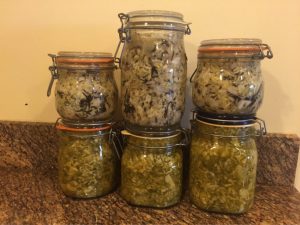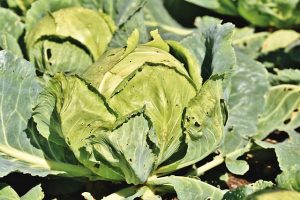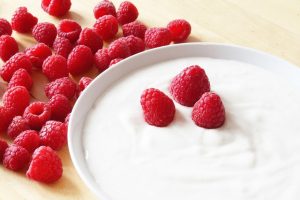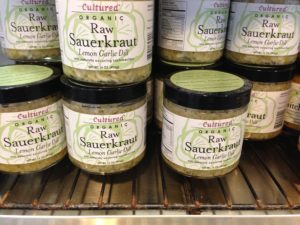Let’s Talk About Probiotics
By now, most people are aware of the beneficial bacteria living in the human digestive tract, and know that they are extremely important for digestive health. And many people are wondering whether they should be taking probiotic supplements and eating probiotic foods to help maintain (or restore) the balance of these beneficial microbes.
To this I would say the right probiotic foods definitely YES, probiotic supplements in capsules, MAYBE.

Sauerkraut is one of the most healing and balancing foods for the digestive system.

So what are the best probiotic foods?
Well in my opinion, there is no better probiotic food than fermented cabbage-based foods like sauerkraut, kimchi, curtido and similar cultured vegetables. This is especially true if you are dealing with any kind of imbalance in the digestive system. Cabbage is a super food loaded with nutrients, amino acids, and fiber. It has incredible healing and restorative properties for the entire GI system, as well as potent anti-cancer properties. Eating a little bit of sauerkraut with every meal helps balance sugar cravings, regularizes the bowels, and restores the stomach and intestinal linings.
Another great probiotic food is miso. It’s easy to add into soups, sauces, and dressings. Just be sure not to heat it too much and destroy many of the beneficial microorganisms.

I’m actually not a big fan of most yogurts…
So what about yogurt?
People often ask my opinion about yogurt, since the dairy industry has done an excellent job of spreading the word about the probiotics in yogurt and certain cheeses. I actually don’t recommend people eat yogurt on a regular basis. I just don’t find that there are any health benefits in mass-produced yogurts, in spite of their claims to be probiotic and “alive”. If you are making your own yogurt, from high-quality organic milk, or getting it from a small artisan/local producer, and know for certain it’s not negatively affecting you, then fine, I can get on board with some yogurt (or kefir).
In Chinese medicine, dairy products cause damp accumulation in the body, which leads to low energy, weight gain, and foggy headedness, among other things. You can think of this like a residue in the body left behind by foods that weren’t able to be digested fully. It just sort of gunks up the system and slows everything down. This is one of the main reasons I typically advise people to avoid dairy products. If you are trying to get more probiotic foods in your diet on a regular basis, vegetable-based fermented foods are MUCH better. You get all the benefits of the probiotic vegetable, with none of the downside of damp and stagnation. (BTW, If you aren’t ready to cut back on dairy just yet, try products made from sheep and goat’s milk, which tend to be much easier to digest, and as a result cause less damp accumulation.)

Thankfully there are many brands available in supermarkets these days. I especially like this one made locally in the Bay Area.
There are loads of fermented foods out there! For a complete list of fermented foods, check out this wikipedia page. Anyone want some kiviak?
Thanks for reading!





